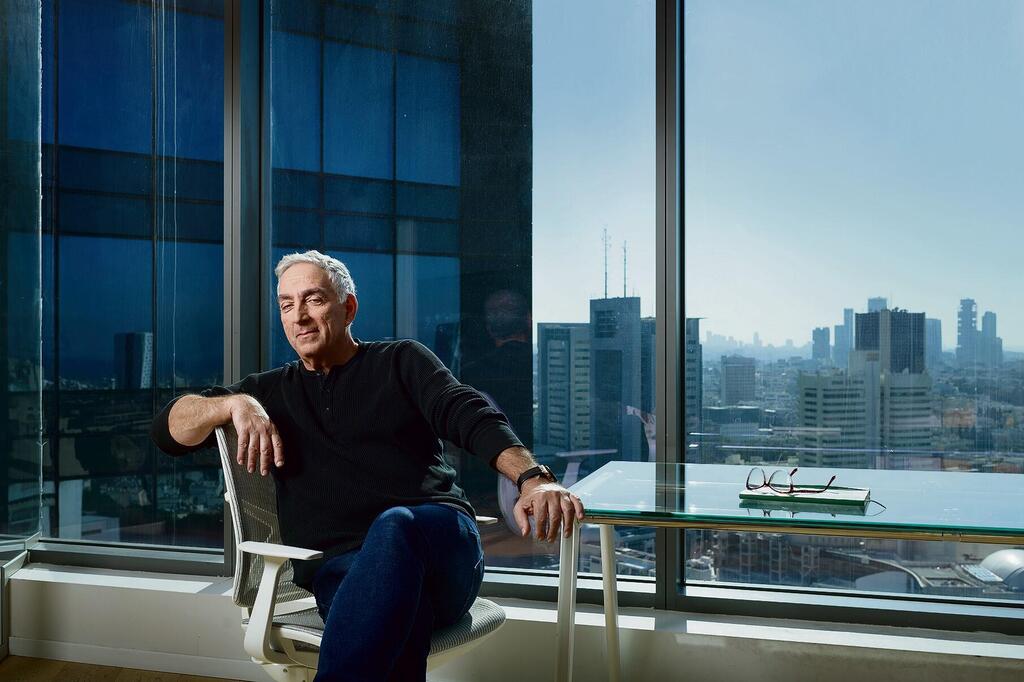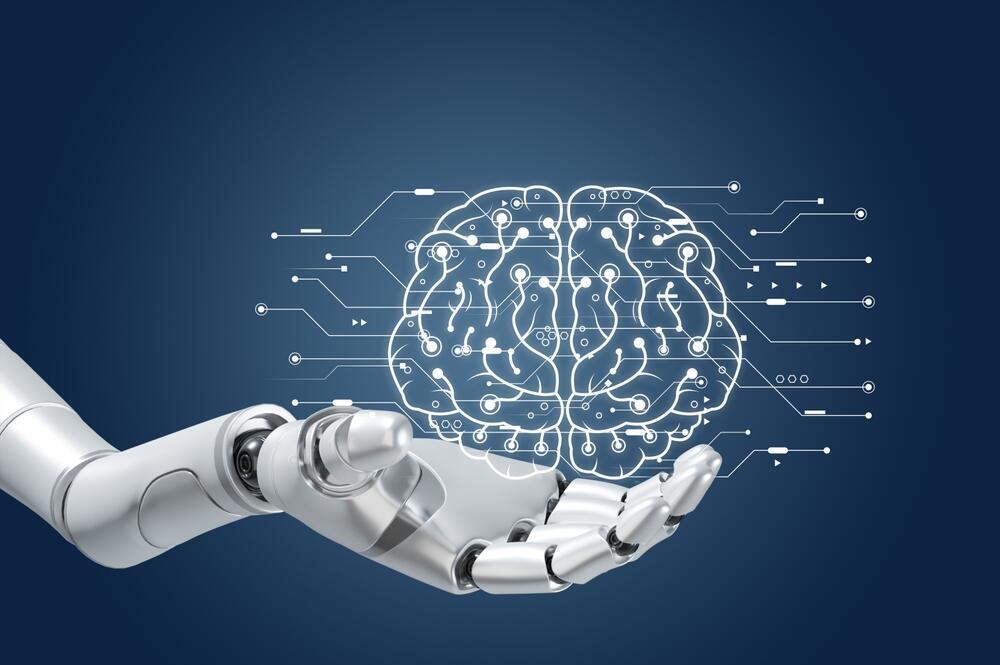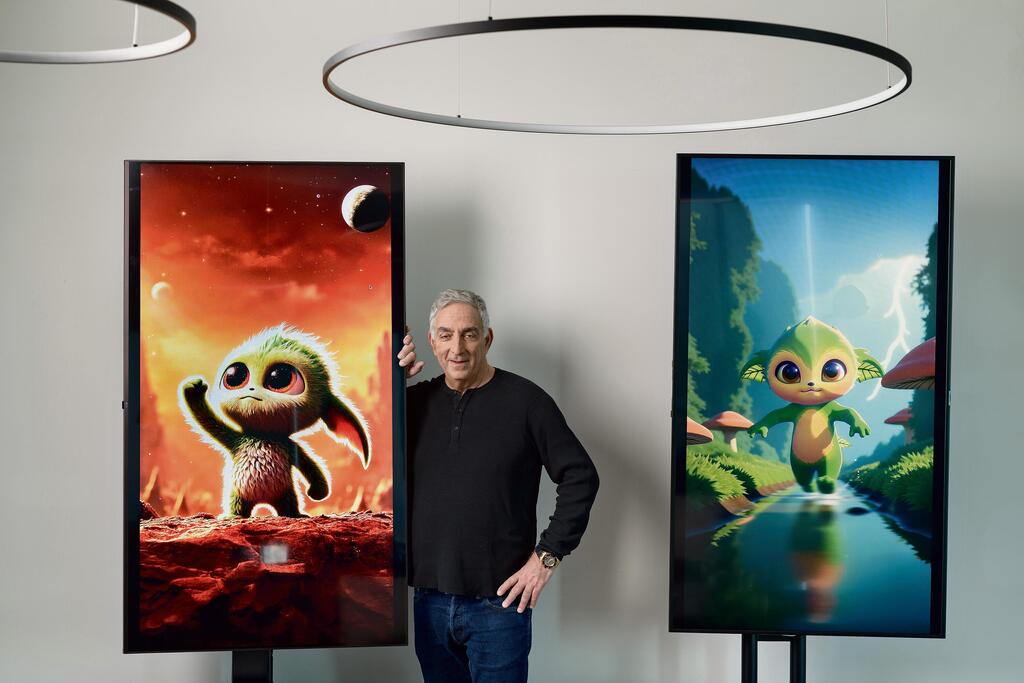Getting your Trinity Audio player ready...
What does care for children with developmental challenges have to do with enhancing sports broadcasts, protecting oil facilities in Gulf countries, a media project to commemorate the Holocaust, reducing anxiety in adults and creating smart cities?
At first glance, there’s no connection. But for Mati Kochavi, it all boils down to one thing: information. More precisely, collecting, analyzing, understanding, presenting and using data that constantly flows from the Internet, social media, satellites and sensors. His goal is to turn information into knowledge. And with knowledge—processed through powerful artificial intelligence tools—you can more or less do whatever you like; protect, inspire or heal.
Today, Kochavi’s focus is on integrating AI into pediatric medical care, but he says his ultimate aim is nothing less than revolutionizing the world. “I’m fighting for the future of humanity,” he tells me. Subtlety is not his style.
If the name Mati Kochavi, 62, sounds familiar, but you can’t quite place it, you likely last encountered him in 2019. That’s when the Israeli entrepreneur and billionaire captivated public attention with Eva.Stories. Created and produced with his daughter, Maya, the project chronicled the life of Eva Heyman, a 13-year-old girl murdered in the Holocaust, through a series of 70 Instagram Stories based on her diary.
Three years later, Kochavi—splitting his time between New York for work and his home in Caesarea—teamed up with his daughter once again to create The Story of Equiano, the true account of an African boy abducted into slavery, this time told through TikTok.
Both projects combined have reached over half a billion views and won numerous awards. Kochavi was inspired to create Eva.Stories after encountering data collected online that highlighted a lack of interest—and presumably knowledge—about the Holocaust among young people.
“What’s happening today, with the rise of antisemitism among the younger generation, doesn’t surprise me,” he says. “We already saw it back then, but no one cared.”
Despite living in the United States for more than 30 years, Kochavi still deeply cares. He considers himself fully Israeli. “I’m Israeli, my children and grandchildren are Israeli, my home is in Caesarea, my language is Hebrew. I travel the world because my life is global. I don’t employ people in Israel, but I’ve been active and involved in dozens of different social initiatives over the years, especially now, when the country and its society are in the eye of the storm.”
One of these initiatives is his dream to build the best kindergarten in Israel for the children of Kibbutz Nir Oz when they return home. “That’s my dream,” Kochavi says.
What’s your take on what the country is going through?
“When there’s so much chaos, conflict and instability, it’s obvious things aren’t working well. It’s poorly managed. Israeli politics is violent; dramatic decisions are made by a razor-thin margin—it’s political bullying. We’ve lost our sense of empathy. This didn’t just happen over the past year. It’s a process. The social contract in Israel is eroding.”
You live in Caesarea, not far from the prime minister. You’ve seen the protests.
“We must not erode democracy in Israel—it will lead to dramatic harm to the Israeli economy. There are processes at play that are hard not to notice: a decline in democracy, rising corruption, bad things are taking place. A corrupt country with deep inequalities cannot succeed. No chance.
Every investor and every businessperson working with or in Israel needs to know that its institutions—courts, banks, the central bank, the state comptroller and others—are independent and strong. This year, the Nobel Prize in economics was awarded to a researcher who demonstrated the direct link between economic growth and the independence and strength of institutions.
Investors go where there’s intellect, innovation and solutions, and these require a democratic environment to thrive. One of the biggest problems we face today is the severe damage done to our democracy.”
“Citizens from all social strata and every part of the country must demand a new social order,” says Kochavi, “one that prioritizes their economic and personal well-being. The public deserves excellent education systems, compassionate healthcare, a fair tax system, a just judiciary and law enforcement that does not compromise in the face of violence. Israeli politics must offer the public an optimistic vision. As of now, that’s not happening.”
'Close and personal relationships with key Middle Eastern Arab leaders'
Despite his many ventures in media and gaming, Kochavi hasn’t abandoned his core field: using information for defense and security purposes. He was among the first Israelis to do business with the United Arab Emirates, and reportedly with Saudi Arabia as well, during 2006–2014—long before the Abraham Accords. His work included securing oil facilities and other sensitive sites, signing contracts to convert planes into reconnaissance aircraft in Greece and installing an array of cameras and sensors across Dubai, turning it into a smart city—one that is especially recorded and monitored.
In a small and ironic twist of history, the system Kochavi, an Israeli, installed ended up helping Dubai’s police identify Mossad agents who assassinated the terrorist Mahmoud al-Mabhouh in early 2010.
Security cameras captured members of the hit squad renting a room, walking around in tennis gear and more, leading to a diplomatic crisis between Israel, the UK, Australia and the UAE.
On top of this, Kochavi employed numerous generals and high-ranking security officials in his defense companies, reportedly paying them handsomely. This drew attention from Israeli media and even criticism from a few anti-Israel websites, which labeled him a spy. He even has an entry on the whistleblower site WikiSpooks.
So, what’s the story here?
“I can’t go into much detail because everything is highly sensitive, but every deal had to be approved by the Israeli defense establishment,” says Kochavi. “I wasn’t involved in cyber operations—everything was about information, sensors and innovative ways to perceive reality in order to protect critical infrastructure. All the projects in the Gulf revolved around these areas.” He clarifies that he didn’t do business in Qatar.
What about arms trading?
“No. Categorically and absolutely not. I consider it morally wrong, akin to drug trafficking. I’m also not impressed by those developing spyware and marketing it globally. I worked exclusively with open-source tools.
“As for employing generals and high-ranking officials, there’s nothing unusual about that. In Israel, it got attention because I brought in security experts, but at the same time, I also hired experts across many fields. That’s all there is to it. In any case, this is all in the past, and I’ve imposed silence on myself regarding this topic to avoid causing any disruptions to more important matters. For me, those years shaped my understanding of the region and its potential. I met a population that was completely different from the stereotypes I had in my mind.”
Alongside his economic ventures, Kochavi cultivated close and personal relationships with several key Arab leaders in the Middle East. “I’ve met most of the region’s leaders and have very close, intimate relationships with them. But back then, I was unique. Today, that’s no longer the case; there are many Israelis doing business there and building relationships. Regardless, Israel’s relationship with the Gulf states and Saudi Arabia has the potential to be a regional and global game-changer. If we can establish ties that go beyond security, it will have a tremendous impact on Israeli society.
“These are nations led by relatively young, innovative and calculated leaders. Yes, they have immense oil and gas reserves, but money alone is no guarantee of power or success. Often, it’s a recipe for destruction. Venezuela has oil and gas, so does Iraq. You need intelligence and leadership.
“Even though they sit on vast energy reserves, they understand they can’t rely on that alone. That’s why they’re investing in areas like artificial intelligence and energy. The transformation of the UAE into a global hub for trade and commerce was planned 35 years ago. Just think of the courage it took to sign an agreement with Israel. It’s a leadership decision that leaves me in awe.”
Do you think the Trump administration will sustain the momentum?
“There’s potential here for a big regional surprise. Saudi Arabia is a central axis in the Islamic world and the Middle East. It used to be said that the Middle East is a tent with two poles: one is Saudi Arabia, and the other is Egypt. In the arena Israel is operating in, the Abraham Accords and regional cooperation carry tremendous weight. As for what lies ahead, many commentators are confident they know the future. I’m not one of them.”
'You’re talking to someone who struggles with very serious mental issues'
Today, it seems almost obvious that immense amounts of data circulating globally can be harnessed for knowledge and insights, but Kochavi was ahead of the curve, one of the first to see its potential. To understand how he arrived at his current focus on pediatric care, it’s worth tracing his journey.
After growing up in Haifa and completing military service in Unit 8200 (“I had a brilliant military career that ended after a year in the reserves”), Kochavi moved to the U.S. in the early 1990s. “I was torn about whether I wanted to be a historian like my father and brother (both history professors). At university, I researched the correlation between Isaac Newton’s scientific and theological thinking.
But ultimately, I made a dramatic decision to leave. I wanted independence and security. A core part of my worldview is that you can’t rely on governments, no matter which ones. You need to be able to provide yourself with security and independence.”
In the United States, where Kochavi continues to work to this day (without American citizenship—he says, “I enter the U.S. just like you, standing in the long line”), he met Stephen Ross, a Jewish-American real estate mogul with a fortune estimated at tens of billions of dollars, and began working for him.
While working in real estate, Kochavi recalls, “I identified the emerging field of data analysis and started a small company focused on security—but only through data. Today, everyone does it, but we were among the first to realize how data can help identify threats. We didn’t deal with fences and guards, but with protection through behavior.”
Behavior-based protection involves identifying anomalies in regular behavioral patterns. For example, a person flying from the U.S. to Israel via Nigeria without any family or business ties there—an anomaly worth noting.
“We didn’t analyze data solely in terms of counterterrorism,” Kochavi explains. “I was interested in how you collect data to provide insights into spatial reality. We tried to understand why traffic jams happen, predict disasters and natural phenomena, monitor the development of health conditions or manage a large port—it was all about data.”
In the years following the 9/11 attacks, the field of homeland security skyrocketed, and for Kochavi, who was already deeply involved, it brought significant opportunities—and success.
Later, Kochavi founded AGT International, which grew into a massive company with deals worth billions of dollars. He expanded not only his business ventures but also the methods of data mining, adding a new ingredient to his data “recipe”: sensors that measure the human body in addition to those that monitor the environment. This field is known as the “Internet of Things.”
<< Get the Ynetnews app on your smartphone: Google Play: https://bit.ly/4eJ37pE | Apple App Store: https://bit.ly/3ZL7iNv >>
“The concept behind AGT,” Kochavi says, “was that we live in two worlds—the physical and the digital—and to create a complete picture, you need the interaction between them. What interested me was understanding human behavior through technology.”
Around AGT International, Kochavi built a network of companies that explored various fields of data generation and utilization, such as cyber, media, gaming and personal training. For example, he equipped UFC fighters (and their gloves, the ring and their trainers) with sensors, models during Fashion Week (including Elon Musk’s mother, a former model whom he describes as “a very nice woman”) and even bulls in rodeo competitions. The data was broadcast in real time to enhance the audience’s experience.
Kochavi also mined the darkest corners of the Internet to create Dark Net, an innovative documentary series he developed with his other daughter, Adi. Released in 2016, it highlighted the dangers of the digital world. He also identified rising antisemitism online, which led to the creation of Eva.Stories, and more. “Everything,” Kochavi says, “was part of studying and understanding human behavior.”
Kochavi’s various ventures have performed quite well, allowing him to continue operating without bringing in outside investors. His companies are always private. This is why his net worth remains unknown, and he, of course, doesn’t disclose it. However, estimates suggest he is a billionaire.
You could have made much more if you went public.
“You’re talking to someone who struggles with very serious mental issues. I value privacy, which is why I don’t give many interviews. I want a quiet life, which is why I don’t take my companies public. I’ve been fortunate enough to be able to do that. For me, the most important dimension is freedom.”
'Revolutionizing the future of young generations in Israel and around the world'
It’s possible to trace how Kochavi’s journey in data collection and utilization—from satellites and sensors to social media and gaming—took him from defense to focusing on pediatric care.
“You can see there’s a very clear narrative,” Kochavi confirms. “At first, it was about understanding the physical environment. Then we said: OK, let’s focus on something even more important than the environment—the human being.”
At first, his work aimed at entertainment, later shifting toward care. “It was all part of the learning process. Even back then, I told people: eventually, we’ll use this knowledge to understand children and help them. But you can’t put sensors on children. Then we thought: wait, there is a sensor that every child has—the phone.”
Around that time, artificial intelligence burst onto the scene. For Kochavi’s companies, which dealt with analyzing massive amounts of data, AI fit like a glove. Unsurprisingly, he’s excited.
“The world is changing. Technologies merging with new knowledge spark revolutions. We’re at a crossroads that will reshape the future. Artificial intelligence will create a new world order—a new economic order, a new social order. Despite the dangers and challenges it presents, AI has the potential to drive extremely significant changes. To me, its greatest power will be in providing personalized support for every child’s development and health during the critical stages of their life.”
Don’t you think your perspective on artificial intelligence is overly utopian?
“Granted it’s heading in other directions as well, but I ask myself what good I can do with AI. Countries that use artificial intelligence wisely will be able to significantly improve public health—and at lower costs. AI can dismantle the social order where people in central Israel get more than those in the periphery. You’re right about the dangers, but there are also aspects that can positively influence the future of humanity, and I don’t think we should be ashamed to say that.”
This is where Kochavi’s latest project, Korro AI, comes into play. Like Eva.Stories, Korro is aimed at children and accessed through a phone screen, but the similarities end there. Korro is an AI therapist—or, to put it more elegantly, an AI-based therapeutic platform designed to support children’s motor, cognitive and emotional (primarily) development through interactive gameplay. The company is launching in Israel, the United States, and soon in other countries.
Two of Korro’s applications are already in use in Israel. The first is a relatively limited feature on Clalit Health Services’ app under its Clalit Active program which is aimed at reducing stress and anxiety in adults through breathing exercises, movement and mindfulness. While there are plenty of similar apps, what sets Korro apart is its integration of real-time metric analysis, such as breathing patterns and heart rate, offering tailored feedback and guidance to the user during the session.
I tried it. It’s incredibly calming and effective. During the seven-minute session, I felt less inclined to wish for a meteorite to crash into Earth and end it all. Few things are more important than easing, even slightly, the immense stress weighing on the Israeli psyche these days. After all, we’re all tense, anxious and depressed. It’s comforting to have something—someone, even—that truly pays attention to how we breathe, even if it’s artificial intelligence. Most importantly, I found myself wanting to return to it again and again.
“The current events are profoundly affecting children in Israel,” says Kochavi. “We must declare a state of mental health emergency for Israel’s children. The ability to provide early intervention and rapid treatment for such a large number of children requires artificial intelligence—there’s no other way. The knowledge we have today about human development, especially during the critical years up to age 17 when the brain is still shaping, is enormous. Our job now is to apply it and reach every single child, everywhere.
“And what’s happening in the meantime? According to official statistics, one in four children in the United States faces developmental, motor or mental health challenges. I don’t know the exact numbers for Israel, but it’s clear there’s an issue. We are treading carefully on this sensitive ground.
“In my view, future generations will consider us a primitive society for failing to fully understand the significance of these critical years. After all, what’s missed during this decisive time is extremely difficult to fix later—if it can be fixed at all. Here, we have an opportunity to introduce an AI therapist at the most crucial stage. The potential is immense. Technology will set us free.”
Maccabi Health Services is already offering a more comprehensive application of Korro designed for children with motor issues. The app has been in use for some time as part of a pilot program involving a few dozen children, and it will soon roll out on a broader scale. I tried it as well, and as far as I can tell, it’s excellent.
Korro integrates several advanced capabilities. The first is highly sophisticated image recognition technology, which analyzes thousands of parameters. The phone essentially watches you with a keen eye, examining every tiny movement of every facial muscle, while factoring in sweating, breathing, heart rate, posture, movement and more. From this data, it produces detailed assessments.
The second capability is a powerful AI engine that constantly updates with the latest expert knowledge. “We’ve downloaded insights from some of the world’s leading minds in mental health and child development,” Kochavi explains. “It’s as if I’m bringing the world’s top pediatric specialist to the bedside of every child, everywhere, to examine them.”
The third feature is the ability to generate, in real time, customized activities, exercises and games tailored to the patient, which adapt and progress with them. The fourth is producing detailed reports for therapists and parents. This app, I felt, truly sees you.
“We’re building something here with the goal of revolutionizing the future of young generations in Israel and around the world,” says Kochavi, pointing to data showing that combining Korro with human therapy yields impressive results and ensures continuity of care.
Pathos makes me slightly skeptical, so I called Hila Moshayev, national director of occupational therapy at Maccabi Health Services and a child development expert. She told me that dozens of Israeli children and therapists have been using the app for about five months, and the results have been excellent. The children are enthusiastic about the app and use it at home, the therapists are pleased with the reports and the parents are seeing progress.
She added that in recent months, Korro has proven invaluable for providing remote care to displaced children, helping to maintain uninterrupted treatment. The app also strengthens the bond between therapist and child by encouraging the child’s independent progress.
“The child’s interaction with a human therapist is critical,” Kochavi emphasizes. “Treatment must be hybrid. Under no circumstances can children be treated without a human therapist, and there is no intention to change that.”









